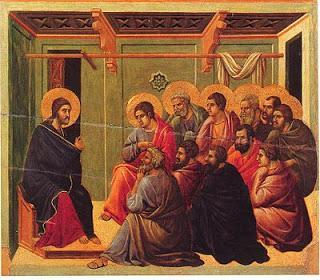What I been sayin,' words mean things. Words matter. They really do.
I'd written back along,
Well, the second problem that ties back into the first (ecclesiastical feminism) is that words mean things. They mean things. Any liberal in any realm in the battle for hearts and minds will first seek to change meanings of commonly understood words in order to co-opt the meaning and then to redefine them to their advantage. Example: sodomite---->homosexual---->gay. In the church world, we no longer sin. We make mistakes. We're no longer Christian. We're Christ followers.
GIBBERISH

Tower of Babel, Pieter Bruegel the Elder (1563)
So. Words matter. Until they don't. The ever-brilliant Carl Trueman writes about The Coming of Age of Today's Gibberish whereupon an "Editor's Note" attempted to say what certain words mean without being too specific about what they really mean. Like the word "woman" and menstruate".Editor’s note: This blog post refers to individuals who menstruate as women because the author wanted to highlight gender inequality in health care. We acknowledge that not all individuals who menstruate identify as women and that not all individuals who identify as women menstruate, but feel this generalization is appropriate considering the gendered nature of most health care policies.
One might translate what the editor is really saying as ‘the concept of being a woman is now utterly meaningless but we have decided to preserve the fiction at those points where it is politically convenient for us to do so.' Notice the editor's use of the vague term feel and the slippery adjective appropriate. As ever, in our aesthetic age, it is impossible to argue against a feeling.

DISCERNING WOMEN
Here, Michele Lesley lists Nine Reasons Discerning Women Are Leaving Your Church and every single one is 100% a 'hear, hear'.
 The absence of discerning women in churches gives rise to many other problems. Godly mothers raise godly children, and absent discerning moms, the next generation of church life suffers. Elder discerning women have much to bring to the table (reason #7) in being the Titus 2:4 women teaching the younger. As discerning women leave churches the less discerning take over and soon you have the blind leading the blind. Third, the contributions to the faith of discerning women are without measure. Within our biblically prescribed roles, we see New Testament women advancing the Gospel and expanding the kingdom in myriad ways.
The absence of discerning women in churches gives rise to many other problems. Godly mothers raise godly children, and absent discerning moms, the next generation of church life suffers. Elder discerning women have much to bring to the table (reason #7) in being the Titus 2:4 women teaching the younger. As discerning women leave churches the less discerning take over and soon you have the blind leading the blind. Third, the contributions to the faith of discerning women are without measure. Within our biblically prescribed roles, we see New Testament women advancing the Gospel and expanding the kingdom in myriad ways.Priscilla and Aquila were discerning enough to see the potential in Apollos and taught him separately. Lydia's home became a hotspot for prayer, teaching, and hospitality-fellowship. Dorcas gently led many women in a worthwhile sewing circle, teaching biblical principles by example.
On the other hand, you have a young and skittish and Rhoda who was so startled to see rescued Peter standing at the gate she shut it and left him there, believing the false but then-widely-popular notion that humans have a doppelganger angel, and that was who came to visit.
Soon, if not already, you will have churches that are absent your wise Priscillas, and Dorcas' and Lydias and instead filled with foolish Rhodas.
Even though it is a bad thing that discerning women are leaving the churches, it is encouraging in a sense if you are one of the discerning women. At least you know you're not alone in your concerns. Read Ms Lesley's piece, it's good.
While Scripture is pretty clear that we can expect women (and men) who are false converts to eventually fall away from the gathering of believers, why are godly, genuinely regenerated women who love Christ, His word, and His church, leaving their local churches?

BURNOUT
 Other men and women are leaving due to burnout. Yikes, burnout is an epidemic, just at the time when we need good men and women ministering to the flock. Please, please avoid burnout. Please, please pray for your pastors and leaders.
Other men and women are leaving due to burnout. Yikes, burnout is an epidemic, just at the time when we need good men and women ministering to the flock. Please, please avoid burnout. Please, please pray for your pastors and leaders.Question: "What does the Bible say about burnout?"
Anyone who has experienced burnout knows it is not something he ever wants to experience again. Burnout is commonly described as an exhausted state in which a person loses interest in a particular activity and even in life in general. Burnout is a state of emotional, physical, social, and spiritual exhaustion. It can lead to diminished health, social withdrawal, depression, and a spiritual malaise. Many times, burnout is the result of an extended period of exertion at a particular task (generally with no obvious payoff or end in sight) or the carrying of too many burdens (such as borne by those in the helping professions or those in positions of authority, among others).

CHURCH MOTHERS

Photo by Alysia Burton Steele
An interesting peek at a part of Christian culture of which I have no experience and very little knowledgeChronicling Mississippi’s ‘Church Mothers,’ and Getting to Know a Grandmother
Ms. Bearden and Ms. Floyd were part of a larger assemblage of 50 African-American women whom Ms. Steele had chosen to chronicle in text and image for a book-in-progress she has titled “Jewels in the Delta.” Whether by formal investiture or informal acclamation, nearly all the women in the book held the title of “church mother,” a term of respect and homage in black Christianity.
 ESCHATOLOGICAL DISCIPLESHIP
ESCHATOLOGICAL DISCIPLESHIP
Jesus giving the Farewell Discourse (John 14-17)
to his disciples, after the Last Supper,
from the Maesta by Duccio, 1308-1311
Eschatological Discipleship
The topic of my dissertation is “eschatological discipleship.” Following Jesus means understanding our times in light of the biblical vision of history and having the wisdom to make the right choices when the path ahead seems unclear.
Many gospel-centered folks are right to point out that the New Testament’s moral imperatives are often grounded in Christ’s finished work for us in the past. What we sometimes overlook, however, is how many of those moral imperatives also look forward to Christ’s return in the future. We are called to be “children of the day” in a world that knows only darkness.
The question that propels me forward is this:
What kind of discipleship is necessary to fortify the faith of believers so that we understand what time it is, we rightly interpret our cultural moment, and see through the false and damaging views of history and the future that are in our world?
That is the question I posed in my workshop at TGC this year: Discipleship in the Age of Richard Dawkins, Lady Gaga, and Amazon.com: Grounding Believers in the Scriptural Storyline that Counters Rival Eschatologies. (The audio from the talk is available here.)
To be alert to our times is a gospel requirement, says Oliver O’Donovan:
I agree.To see the marks of our time as the products of our past; to notice the danger civilization poses to itself, not only the danger of barbarian reaction; to attend especially not to those features which strike our contemporaries as controversial, but to those which would have astonished an onlooker from the past but which seem to us too obvious to question. There is another reason, strictly theological. To be alert to the signs of the times is a Gospel requirement, laid upon us as upon Jesus’ first hearers.
Enjoy the day today friends, look forward to the future and keep looking up!
